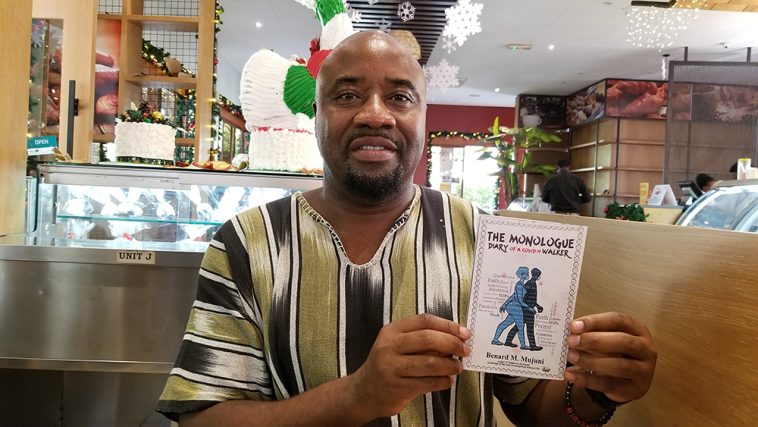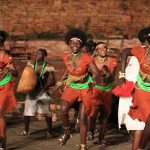Imagine it’s 2075, and your grandson finally asked you, “How did you survive the Covid19 pandemic?” One of the best answers to this question is, “Read The Monologue Diary of a Covid19 Walker.”
Of the many great things Benard M. Mujuni has done, he will be remembered for telling one of the saddest stories of our beautiful lives in a comical way.
Dr. Henry Zakumumpa, a former classmate of Benard and now a Health Systems Researcher at the prestigious Makerere University described his writing style in Chinua Achebe’s language as, “Owners of Words,” and the English call them, “Men of Letters.”
It is not possible to talk about the Covid19 pandemic and not talk about death. True to his skillful writing style, Benard in his introduction of the book, The Monologue Diary of a Covid19 Walker cites Sir William Shakespeare’s, Death cometh when it must come” to hook us to the hopeless situation of death that we faced during the Covid19 pandemic.
In my view, Benard was consoling us from the beginning that when it’s time to die, you will die so let’s embrace death as something we cannot escape.
The setting of this book is in the neighbourhood of Naalya, Kampala as Benard traces his routes to the Northern By-pass for his daily walks and the many other routes. The mention of Naalya gives the story in the book authenticity, especially for readers who understand routes bordering Kira in the north, Kyaliwajjala and Namugongo in the northeast of Kampala.
This book is Benard’s account of his daily experiences and is written in first person account of his Covid19 experiences. He poetically narrates the desperate moments when Covidex; Uganda’s own medical innovation after the Western World started hoarding vaccines, looked like the magical bullet to sort our Covid19 concerns.
Benard uses 100 poems clustered as 10 poems for each chapter to poetically share the shock, resignation, and indignation of the entire social fabric of our society to the pandemic. He then codifies these experiences in its reality form; written in simple English, flavoured by his local dialect that even further gives it an authentic feeling based on his persona’s rigorous insight, hindsight, and likely oversight experience.
In the first Chapter, poems like Covid19 and Later Day Joggers depict the new habits like walking, jogging, content creation etc that many people adopted to overcome the redundancy of staying at home.
In the poem Waiting for the Moon Under Lockdown Cover, Benard laments the much longer daytime and nights that kept them locked at home under curfew.
In Chapter Two, Poems like We Shall Survive are poems Benard in my view uses to develop resilience over the pain and suffering brought about by Covid19 pandemic.
Benard clearly speaks to the reality that there is no room for resignation and that people are not ready to give up without a fight.
True to who exactly he is, Benard never misses a chance to be funny even in serious moments. In Chapter Three, Benard in his poem Underpants as a Facemask uses humorous lines to express the state of mental health and breakdown of the youths who resorted to drinking and sexual immorality as a new way of life despite the curfews.
As I alluded in the previous paragraphs, the structure of Benard’s book is 10 poems each for all the 10 chapters in 236 pages. The interior design and font used makes it user-friendly such that the page numbers don’t bother a reader. Benard’s choice of words is also simple and funny that keeps a reader hooked to it, page after page.
To keep readers even more hooked, Benard playfully uses erotic humor like those thrillers borrowed from books like Mills and Boons making him more of a comical writer.
I must admit, writing poems that are comical is not for everyone unless you are really gifted like Benard, and he has a way with wordplay that gets his points perfectly to readers.
There are moments in the book that I felt either I lacked a comical mind, or I was just too serious about my Covid19 experience; I felt Benard over played with words and became his own fan to the point of losing meaning in some of his lines.
Towards the end, Benard shares more personal stories that drive me to ask myself who will clean Benard’s tears? I could tell, the element of mourning in the intonation of his words.
I could also tell frustration in his voice as he shared more emotionally draining moments. A case in point is chapter 8, his language changes from comical to tough gong like words. In poems like The Death of Mosquito, he shares his frustration in small things like Mosquito that scares humanity. I presume this is in relation with the Corona virus that bullied the world.
In Ghost at a Railway, Benard speaks of trauma and ghostly feelings and his daydreams in a monologue. Certainly, a reader can pick his frustrations with the pandemic and how it had taken its toll on him.
I am tempted to say more but feel like, you need this book to know how I felt when I got done. But to capture such moments, I want to again quote from his best friend Dr. Henry who described the book as: a delicious feast of a hundred sumptuous meals in one serving. It is a compelling personal account of the Covid-19 lockdown in Uganda which grew to include his musings on life in general with lively, entertaining imagination.
In the book’s Monologue Testimonies of Covid19 pandemic pages, there are positive commentaries like Rwanjeru Pelly’s experience during Covid19. Pelly says:
“In the COVID period, I got enough time to organize my home.” — RWANJERU PELLY
I need not say more. In the book you will find 5 pages of Monologue Testimonies to rekindle your memory of the days of Covid19.
I conclude on an ironical note. While Benard’s effort has been to document these experiences so that we may not forget; sadly, most Ugandans have forgotten Covid19 experiences and moved on as if it doesn’t matter. It Matters.
This book is one other way, we can connect with those we lost and the realities that the world will never be the same after the Covid19 pandemic.
This post was created with our nice and easy submission form. Create your post!





